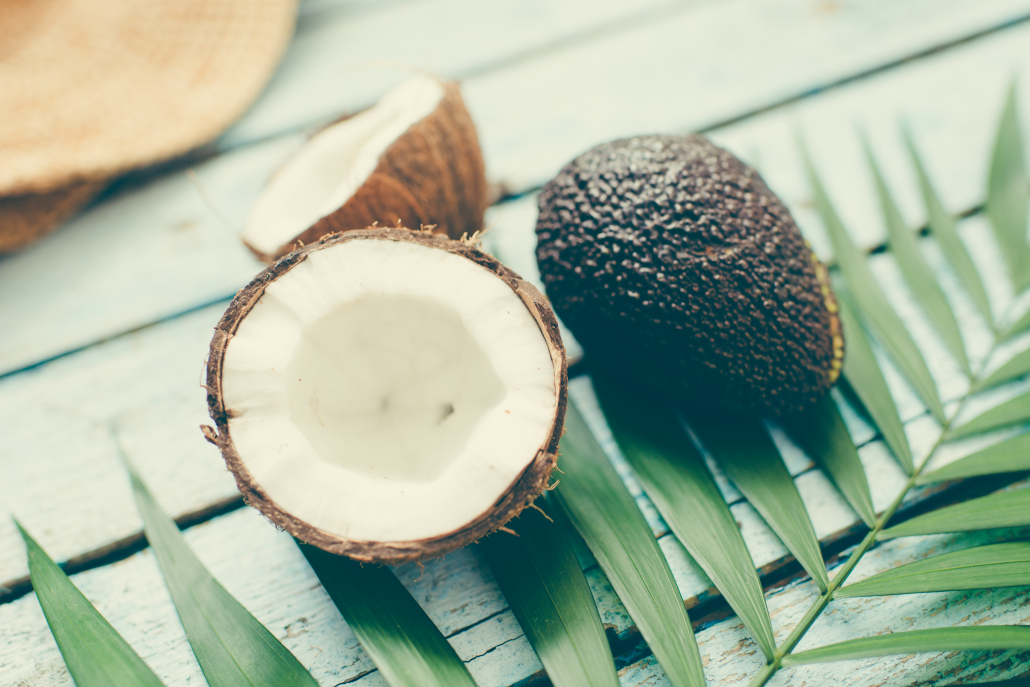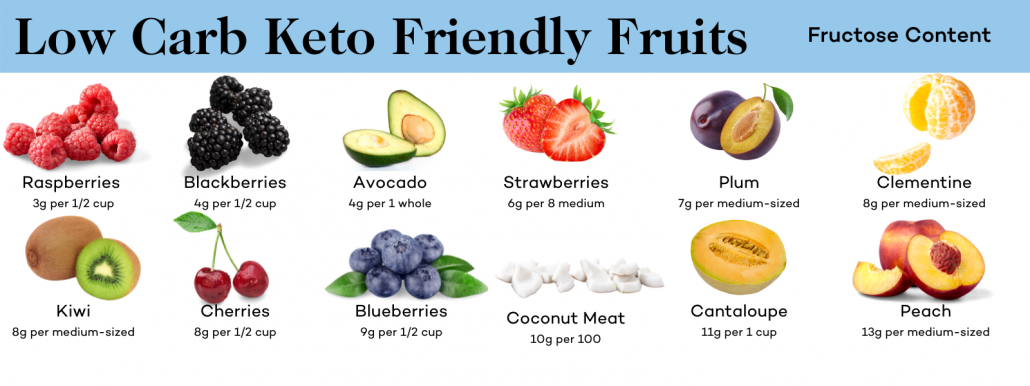We include products in articles we think are useful for our readers. If you buy products or services through links on our website, we may earn a small commission.
Keto Fruit List: Top 7 Low Carb Fruits

Table of Contents
The keto diet is a newly popular way of eating that calls for drastically cutting down on carbohydrates. That means breads, pastas, baked goods, and, yes — most fruits — are off-limits. Some fruits are low enough in carbohydrates, however, that you can fit moderate amounts of them into the keto diet without going over 20- 60 grams of carbs per day. Let’s explore the fruits that make it on the low-carb keto fruit list.
Keto Diet Fruit List

Keto diet-friendly fruits have two major things in common:
- They’re low in fructose
- They’re high in fiber, which lowers net carb content even further
A note on fiber: Fiber is not essential, and surprising for most people, has not been found to provide any net health benefits.
In fact, recent studies have found that diets high in insoluble fiber are linked to diverticulitis, IBS, and constipation–just the opposite of what we’ve been told for decades. You can read more about these fiber myths and truths here. 1
The chart below highlights ten keto-friendly fruits that fit the bill according to both metrics.
Keto Fruit Chart
| Low carb fruit | Fructose content | Fiber content |
| Raspberries (½ cup) | 3 grams | 4 grams |
| Blackberries (½ cup) | 4 grams | 4 grams |
| Avocado (1 whole) | 4 grams | 14 grams |
| Strawberries (8 medium) | 6 grams | 2.8 grams |
| Plum (medium-sized) | 7 grams | 0.9 grams |
| Clementine (medium-sized) | 8 grams | 1.3 grams |
| Kiwi (medium-sized) | 8 grams | 2.1 grams |
| Cherries (½ cup) | 8 grams | 1.3 grams |
| Blueberries (½ cup) | 9 grams | 1.8 grams |
| Cantaloupe (1 cup) | 11 grams | 1.4 grams |
| Peach (medium-sized) | 13 grams | 3 grams |
Top 7 Keto Low Carb Keto-Friendly Fruits
Let’s take a closer look at the carbs content and health benefits of the top 7 keto-friendly fruits.
1. Coconut Meat
Though there’s the word “nut” in the name, coconut is officially a fruit, and it plays a starring role on our keto fruit list. The flesh, or ‘meat,’ of coconut is especially nutritious.
Coconut meat carb content
A cup of coconut meat contains just 10 grams of carbs. Not bad considering this same cup contains over 280 calories! These calories come mostly from fat–a great thing on the keto diet.
Coconut Meat health Benefits
Coconut meat is associated with multiple health benefits, including:
- Higher satiation
- Lower body weight
- Better cognitive function
- Improved body composition
Coconut stands out from most other fruits for several reasons. For one, most of its calories come from fat. Secondly, most of its fat calories come from highly saturated fats (89%, to be exact). [9]
Studies show that the medium-chain fatty acids (MCTs) in coconut meat are absorbed through your small intestine and converted to ketones that your body easily uses as energy. [10]
This can make coconut a helpful when transitioning to keto, while reducing keto side effects.
In addition to the satiation that comes from fat, coconut meat’s fiber content might make it even easier to stay full and avoid snacking between meals. [11][12]
Other potential benefits of coconut meat, coconut shreds, coconut manna, and coconut oil include:
- Improved immunity: coconut is rich in manganese and other immune-boosting compounds. And even the medium and long-chain fatty acids present in coconut products may reduce bacteria counts and suppress viral infections. [13]
- Normalized blood sugar: by boosting ketone production and shifting your body further into fat-burning mode, coconut products might make it easier to keep blood sugar under control. This fruit may lower your fasting blood sugar and alter your gut bacteria to aid blood sugar control. [14]
- Boost cognitive function: some people notice a tangible cognitive boost when they eat coconut products. You can thank the medium-chain-triglycerides in coconut oil for that! In the long run, MCTs may even protect against brain metabolism problems like Alzheimer’s and dementia. [15]
2. Avocado
Avocados are a fruit that most people think of as a veggie. In fact, we also include it in our list of low carb keto veggies. Because a single avocado averages a robust 30 grams of fat and only 4 grams of net carbs, it’s truly the most keto-friendly fruit, even if you don’t find it very fruity.
Avocado Carb content
A single avocado contains around 18 grams of carbs per one-cup serving, yet only 4 grams of these are net carbs. That’s thanks to 14 grams of fiber. In other words, avocados aren’t likely to kick you out of ketosis anytime soon.
Avocado Health Benefits
Avocados are associated with multiple health benefits. They’re a rich source of vitamin K, vitamin C, potassium, and folate. [2]
Potassium can be hard to come by on a keto and carnivore diet unless you’re eating a nose-to-tail meal plan that includes organ meats and potassium-rich cuts of steak like tri-tip and ribeye.
3. Blackberries
Blackberries Carb Content
Blackberries contain just four grams of carbohydrates per serving, making them one of the lowest-carb fruits of all. Their carb content is matched by an equally high amount of fiber.
Blackberries Health Benefits
Blackberries are associated with multiple health benefits. Their vitamin C content is largely the reason, at 36% RDV per 1 cup serving. Vitamin C plays a vital role in: [1]
- Wound healing
- Skin regeneration
- Collagen formation
- Safeguarding against scurvy
- Improved antioxidant status
4. Raspberries
Due to being relatively low in carbs, raspberries can be enjoyed in moderation on keto. But does that mean these fruits are good for you? The jury is still out. But it’s safe to say that in small amounts there’s nothing to worry about.
Raspberries Carb Content
Raspberries contain just 7 grams of net carbs per serving: 15 grams of glucose/fructose and 8 grams of fiber. [3]
Raspberries Health Benefits
Like many other fruits, raspberries are high in antioxidants. Yet the antioxidants in fruit are poorly absorbed in the body and quickly eliminated.
If you’re looking for more bioavailable antioxidants, keto superfoods, keto meats and organ meat supplements are superior options.
That being said, a 1 cup serving or raspberries offers polyphenols, 36% of vitamin C, and small amounts of vitamin K, and copper.
The antioxidants in raspberries have been shown effective for combating aches and pains. [4]
To make your raspberries even more keto-friendly, enjoy them with heavy cream and other full fat dairy like keto yogurt and keto cottage cheese, or any number of rich keto cheeses.
5. Cantaloupe
Cantaloupe may be a surprising addition to a keto fruit list. For one, it tastes really sweet. But it’s actually one of the lower-carb fruits.
Cantaloupe carb content
For something as sweet cantaloupe, it’s surprisingly low in carbs. A one-cup serving contains 12 grams of fructose and 1.5 grams of fiber. [5]
Cantaloupe Health Benefits
A 1-cup serving of cantaloupe contains decent amounts of potassium, K1, and 73% RDV of vitamin C.
Cantaloupe is a great source of vitamin A beta carotene, at 200% RDV per serving. This orangish plant pigment boosts immunity, preserves eyesight, and gives our skin a healthy glow. [6] Feel free to enjoy cantaloupe in moderation on your keto diet.
However, the vitamin A found in plant foods is inefficiently converted to a useable form in the body. If you’re looking to significantly boost your vitamin A, beef liver, and beef liver supplements provide the richest and most bioavailable vitamin C on earth.
Perhaps the best benefit of cantaloupe is simply that it’s mostly water and will help you stay hydrated which is linked to numerous benefits including kidney health, proper digestion, and heart health.
6. Strawberries
Strawberries carb content
Strawberries contain just 6 grams of carbs per serving. If you’re dealing with extra large strawberries, think of it this way: each fruit contains one gram of carbohydrates.
Strawberries health benefits
Strawberries are loaded with antioxidants. The oxidation-fighting highlights include: [7][8]
- Vitamin C
- Ellagic acid
- Manganese
- Procyanidins
- Anthocyanins
Strawberries are both delicious and truly nutritious. They’re also one of the easiest fruits to incorporate into a low carb or keto diet.
The vitamin C in strawberries may also boost libido while protecting against prostate cancer. Which can’t be said for vitamin C supplements–only the vitamin C you get from whole foods. 2
7. Peaches
Peach carb content
Peaches contain roughly 13 grams of carbohydrates per serving. While that’s higher than most of the fruits on our list, it’s still possible to incorporate small amounts of peaches into your keto diet.
Peach Health Benefits
Peaches are classified as a stone fruit, which just means they have a large, inedible inner seed. In addition to being delicious and uniquely textured, peaches are a decent source of many micronutrients. They’re rich in vitamin A, vitamin C, B vitamins, and potassium. [16]
Peaches are also associated with some health benefits on a more macroscopic level. One study involving nearly 1,400 people found that eating peacher and other fruits was associated with reductions in several heart disease risk factors. [17]
A study of postmenopausal women found that those who ate atleast 2 peaches or nectarines each day reduced their risk of breast cancer by 41% over 24 years.18
Fruits to Avoid on Keto
The above fruits may be kosher when it comes to staying keto…but the below types of fruit are not.
- Dried fruits
- Fruit juices
- Tropical fruits
Dried fruits
Dried fruits are much more concentrated in sugar than their fresh counterparts. They’re also much easier to overeat. A 100 calorie apple may be satiating, for example, but a 100-calorie serving of apple chips definitely isn’t.
Fruit juices
Fruit juices simply can’t compare to their unprocessed counterparts. Drinking juice is simply not the same as eating whole fruit. That’s because fruit juice’s combination of high fructose and low fiber is a perfect recipe for blood sugar chaos.
Another problem? Product quality. Many of the fruit juices in today’s grocery stores aren’t even made from actual fruit. They’re just a fruit concentrate mixed with extra sugar and some water. Fruit juices are often more acidic and lower in antioxidants than you’d expect from fresher fruit. [18]
Within the past several years several studies have linked sugar drinks to unwanted weight gain. One study from 2019 found that just 100 ml of sugary drinks per day (that’s less than ⅓ of a can of soda) raised one’s cancer risk by 18%. Even pure fruit juice was correlated with increased cancer rates. [19]
Tropical Fruits
Tropical fruits tend to be higher in carbs than their non-tropical counterparts. That makes them off-limits for those who want to follow a keto diet. Unless you have impressive amounts of self-control, it’s probably best to avoid the following fruits entirely:
- Pineapple
- Mango
- Papaya
- Guava
Drawbacks to Fruit
Most fruits tend to suffer from two major drawbacks: they’re high in both fiber and antinutrients. Let’s take a look at these problems one by one.
Fiber
Many fruits are a rich source of fiber. While the presence of fiber reduces net carb content, it can also be problematic. Avocados and citrus fruits tend to be highest in fiber.
A type of fiber called soluble fiber can be especially damaging. This type of fiber forms a gel-like substance within the colon, slowing down digestion enough to raise your risk for SIBO. [21]
In other words, fiber may not be the digestive aid nutritionists once claimed it was. Fiber might actually promote the very things we once used it to avoid: bloating, inflammation, and colon cancer. [22]
A recent review from the World Journal of Gastroenterology looked at every single study involving fiber and colon health that’d been published in the previous 35 years. After going over the evidence, the study’s authors made a surprising conclusion:
“A strong case cannot be made for a protective effect of dietary fiber against colorectal polyp or cancer. Neither has fiber been found to be useful in chronic constipation and irritable bowel syndrome. It is also not useful in the treatment of perianal conditions. The fiber deficit-diverticulosis theory should also be challenged…we often choose to believe a lie, as a lie repeated often enough by enough people becomes accepted as the truth. We urge clinicians to keep an open mind. Myths about fiber must be debunked and truth installed.”
Antinutrients
Many fruits contain plant toxins and antinutrients that can bind to the very same nutrients they contain. When it comes to antinutrients, the biggest offenders are probably tannins.
Tannins pass through the digestive tract all the way to the colon, binding to proteins and wreaking havoc along the way. Tannins can reduce our ability to absorb iron, B vitamins, and other nutrients from our food. On the bright side, tannins don’t seem to reduce the absorption of heme iron from red meat.
If it sounds like we have a bias towards animal whole foods, it’s because we do, and it’s backed by science along with an anthropological awareness that humans evolved on a diet centered on meat. In fact, our caveman ancestors were essential hyper-carnivorous apex predators who ate fruit only occasionally.
Keto Fruit List: The Takeaway
In moderation, the fruits on this low-carb keto-friendly fruit list can be a harmless and marginally healthy addition to a keto diet. That being said, fruit isn’t a must-have food item. Most, if not all, of the nutrients in fruit can be obtained in more bioavailable forms through nose-to-tail eating. Stick with the following fruits if you want to get results from your keto diet:\
- Avocado
- Coconut
- Raspberries
- Blackberries
- Strawberries
- Plums
- Clementines
- Kiwis
- Cherries
- Blueberries
- Cantaloupes
- Peaches
And be sure to stay away from the following types of fruit:
- Dried fruits
- Fruit juices
- Tropical fruits
















